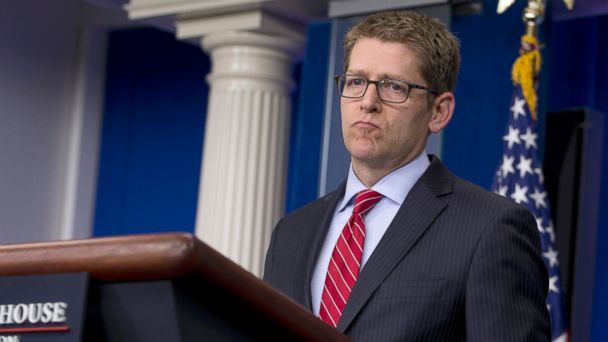Carney Gets Candid: White House Press Secretary Opens Up to Students

(Carolyn Kaster/AP Photo)
With his press briefing book sitting closed next to him, White House Press Secretary Jay Carney doesn't have much to refer to when a person asks if he wants to take a "selfie."
"Absolutely," Carney said, after an audience member at George Washington University promised it wouldn't be taken on a Samsung device - referring to the recent controversy with Boston Red Sox player David Ortiz' selfie with President Obama.
Carney opened up today in a rare "conversation-style" interview, with a noticeably more candid tone at times than most White House reporters have grown accustomed to.
Here are seven takeaways from the event:
1. He never had aspirations of being a White House Press Secretary:
"I was a reporter for 21 years - 20 of them at Time Magazine. I loved being a reporter," Carney said, adding that he'd been recruited by Vice President Joe Biden after the 2008 election to be his communications director. That's when Carney said, "I woke up every morning for probably six months wondering whether I could do what I was doing or if I was cut out for the job."
2. The story behind deciding to accept the 'Between Two Ferns' interview:
"We obviously look at ideas and we have some crazy ones that we don't take. But I think that there's an advantage to pushing the envelope. There was a conversation about wanting to help, it was their idea. Four of us presented it to the President and he has a pretty good compass on his own," Carney said. "We knew there was some risk associated with it but it was a smart thing to do. We were trying to reach you [young people], and more people watch Funny or Die and click on Between Two Ferns interviews than watch the Evening News or the morning shows."
3. He thinks Jon Stewart probably gave the hardest interview during the President's re-election cycle:
"I remember we were having the discussion during 2012 about whether it was appropriate for the sitting President to give interviews to Jon Stewart and others," Carney recalled. "I think if you look back at 2012 and the sitting interviews that the President of the United States gave, probably the toughest interview we had was with Jon Stewart. Probably the most substantive, challenging interview that Barack Obama had in the election was with the anchor of the Daily Show."
4. Not surprisingly, the Healthcare.gov rollout was the toughest moment of his tenure (so far):
"This was something that was entirely on us. It was our fault. We built the system, it was supposed to work far better than it did," Carney said. "That made this unique because a lot of the more challenging times that we face have to do with external events or bogus charges or things like that. This was something that we controlled, that we didn't get right at the start."
5. He disagrees with reporters who say President Obama deserved Politifact's 'Lie of the Year' for his "If you like your health care, you can keep it" promise:
"I think that a lie is one of intent, and that the president believed that is what the policy would deliver. When it didn't, it became clear that if there was anything we could do to fix, or help those individuals, then it ought to be done," Carney said.
6. He might not be 100 percent behind the Pulitzer Prize board's decision to honor the Washington Post and the Guardian on the stories from Edward Snowden's leaks:
"I'm not going to comment on specific prize winners. My view, in general, is that the best of those awards go to reporters who break new ground through the shoe-leather reporting of the past and who develop sources, find information, devote hours, days, weeks and months to getting a story right," Carney said. "I think year after year you see the Pulitzers and other similar awards - [the] work held up that meets those standards."
7. Responding to complaints of a non-transparent White House, he said the Obama White House is the most transparent ever:
"I've covered the previous two administrations and know a thing or two about ones before that. There's never been a more transparent administration," Carney said. "It is absolutely the case today, and will always be the case that the White House Press Corps will not be satisfied with the level of access it has to the President or the rest of the President's team. There will always be meetings, there will always be a limit on the number interviews or press conferences because it simply is impossible for the President or any White House to function otherwise. But the press should keep pressing for more access."